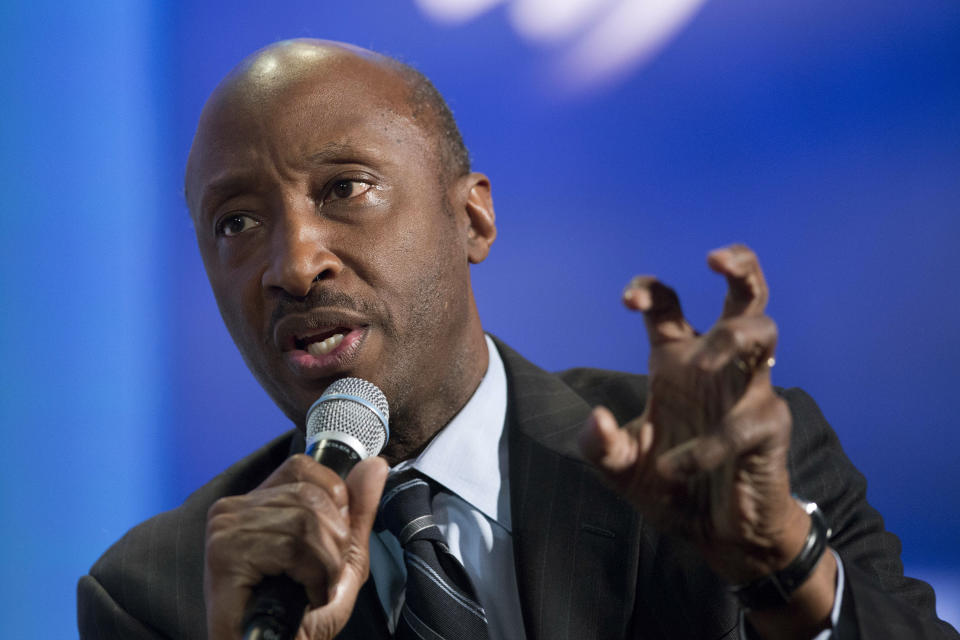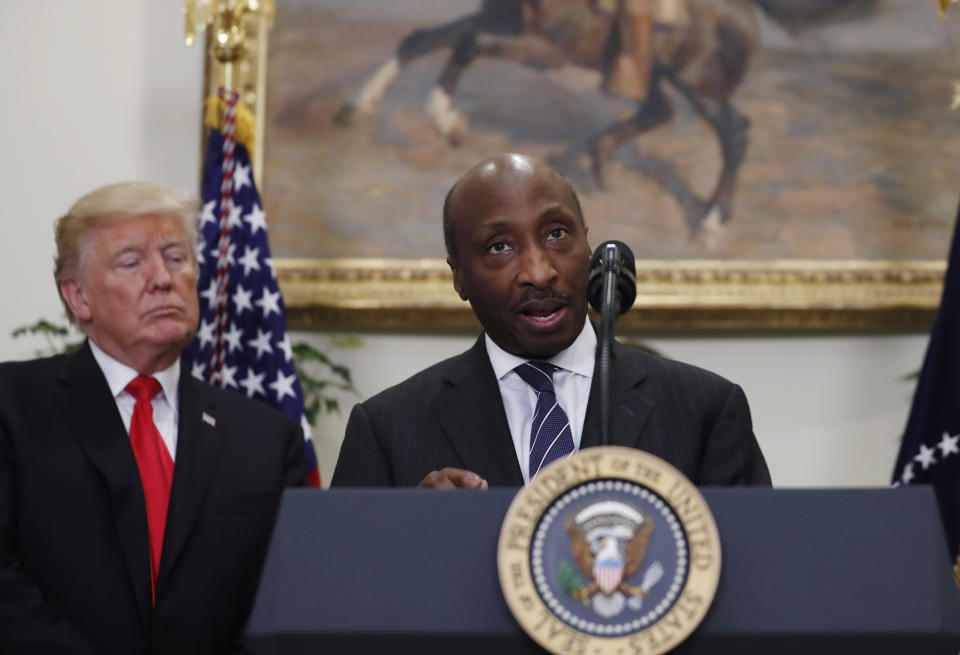Merck CEO Ken Frazier set to open Yahoo Finance's All Markets Summit
On Thursday, Kenneth Frazier, the CEO of pharmaceutical giant Merck (MRK), will kick off Yahoo Finance’s annual All Markets Summit in a keynote conversation with editor-in-chief Andy Serwer.
This year’s AMS theme is “Generational Opportunities” — and Yahoo Finance chose Frazier because he’s uniquely qualified to address the idea as the leader of the largest of the Big Pharma companies.
Merck, known as MSD outside of the U.S., is paving the way to a brighter and healthier future with its life-saving medicines, particularly in oncology, and its commitment to cutting-edge research to find new treatments and cures.
What’s more, Frazier’s experience as CEO of the New Jersey-based global pharmaceutical giant offers a playbook for how to deliver value to all stakeholders over the long-term.
This important conversation is also happening against a backdrop where people worldwide are now turning to business, particularly their own employers, to take the lead on hot-button social issues. The 2019 Edelman Trust Barometer found that 71% of employees look to their CEO to speak up on industry issues, political events, national crises, and employee-driven issues.
And Frazier is certainly no stranger to speaking out on hot topics. In August 2017, he joined other CEOs in publicly breaking with the Trump administration, in the wake of the president’s controversial response to white supremacist violence in Charlottesville.
The Philadelphia native has served as Merck’s CEO since 2011, and is the first African American chief of a pharmaceutical company. A year ago, in what was viewed as a major vote of confidence, the company board altered its mandatory retirement rules just to keep Frazier on past his 65th birthday, which he’ll celebrate in December 2019.
The 128-year-old company has more than 70,000 employees operating in 140 countries, generates more than $40 billion in revenue, and spending billions on research-and-development.
During his tenure, Frazier has prodded the company into initiatives that go beyond making money for shareholders. For instance, the company has for 30 years donated Mectizan, a drug that treats river blindness in certain African and Latin American countries. Merck has treated around 20,000 patients for free with its top-selling cancer immuno-therapy treatment, KEYTRUDA, which carries a list price of around $164,000.
One of the key milestones from Frazier’s leadership at Merck is that the company is now a leader in immuno-oncology. KEYTRUDA, which was first approved in 2014, is now used for many different types of cancer, and continues to be used in hundreds of clinical trials for other cancers. As of the end of 2018, some 175,000 patients have been treated with the drug.
From North Philly to Big Pharma

Perhaps to best understand Frazier and where he’s going, one has to look where he’s been.
He grew up in a lower-income neighborhood of North Philadelphia, and never aspired to be a pharmaceutical executive. His mother died when he was young and he and his siblings were raised by his single father who worked as a janitor, and encouraged his kids to succeed.
“My father had a very strong view of what it took to be successful, and he in effect brainwashed all his children to think that we could do anything,” Frazier told the Harvard Law Bulletin in a 2011 interview. “He had very high personal standards. Although he was a janitor by accident of birth, I believe he could have been a CEO of any company.”
Frazier went on to earn his undergraduate degree at Penn State University (where he would later serve as a member of the board of trustees from 2009 until 2015), and a law degree from Harvard. After leaving there, he worked as a corporate litigator for a top Philadelphia law firm of Drinker Biddle & Reath.
One of the defining moments of his life and career was taking on a death penalty case in Alabama pro bono. A corporate litigator who wasn’t a criminal trial attorney, Frazier led a team of volunteers who represented James Willie "Bo" Cochran, an African American man who had spent 19 years on Death Row.
What Frazier found was that Cochran had been convicted of capital murder on highly circumstantial evidence in what was actually an accidental police shooting and cover-up. Cochran was denied “virtually all of the fundamental rights” during the trial-- from an underequipped court-appointed lawyer who lacked the time to understand the case, to the prosecution purposely removing African-American jurors.
In 1997, five years after Frazier’s team met Cochran, the accused won his right to a new trial, only to be acquitted by a jury that was not selected on the basis of race. It took less than an hour to clear him of a crime he never committed.
By that time, Frazier was already working for Merck, his former corporate client during his time at Drinker Biddle & Reach. He joined the pharmaceutical company in 1992 as a general counsel of its joint venture with Astra AB.
At the suggestion of his predecessor Dr. Roy Vagelos, Frazier moved from the legal department to serving as a vice president of public affairs. After that, he was named assistant general counsel, and then general counsel. He also served as the president of global human health, Merck’s sales and marketing division. He became president of Merck in 2010 and was appointed CEO a year later.
Blasted by Trump

In his book, “The Moral Corporation,” Vagelos described Frazier’s “combination of technical and people skills, energy, and self-discipline” as critical skills that put him on “the corporate fast track.” Vagelos wrote the CEO is “completely open and honest, which are qualities extremely important to me.”
But it wasn’t until August 14, 2017 that some of Frazier’s personal qualities became publicly visible.
On that day, he resigned from American Manufacturing Council following President Donald Trump’s polarizing response to the violence committed by white supremacists in Charlottesville, Virginia.
In a strongly-worded statement, Frazier embraced diversity while calling on leaders to “honor our fundamental values by clearly rejecting expressions of hatred, bigotry and group supremacy, which run counter to the American ideal that all people are created equal.”
Less than an hour later, Trump blasted Merck, adding that Frazier should now have "more time to LOWER RIPOFF DRUG PRICES!"
Frazier made his decision in spite of the president’s inevitable Twitter tirade. And by doing so, he paved the way for other CEOs to follow his example, and resign from their respective councils.
‘Common commitment’
According to Frazier, there are many issues facing the pharmaceutical industry currently -- from the rising cost of research and development to the political pressure surrounding drug affordability and pricing.
However, these challenges also present opportunities for Merck and its CEO.
“Many diseases don't have any good treatment today. And if we're really going to think seriously about bending the cost curve around the world, I believe that drugs and vaccines -- innovative drugs and vaccines can be part of that answer,” Frazier said at the company’s investor day this summer, an event held every five years.
As drug affordability continues to be a major issue, Merck was among the first to provide an annual report disclosing net price changes across its products. The company has also implemented programs to help patients who can’t afford their medications, while also maintaining its commitment to investing in research and development.
At Merck’s investor day, Frazier said that “demand for truly innovative products will remain high despite the pressures around affordability.”
There will continue to be opportunities to find the next life-saving medicines and solve some of the world’s most pressing health issues. Frazier believes it’s not a job for just one person, but rather an opportunity for all generations.
As CEO, Frazier said that he’s been focused on “building [a] deep bench of talent, because at the end of the day when you see an execution strength, like we've shown in KEYTRUDA, it's the result of a talented group of people who're working together with a common commitment.”
Julia La Roche is a finance reporter at Yahoo Finance. Follow her on Twitter.

 Yahoo Finance
Yahoo Finance 

